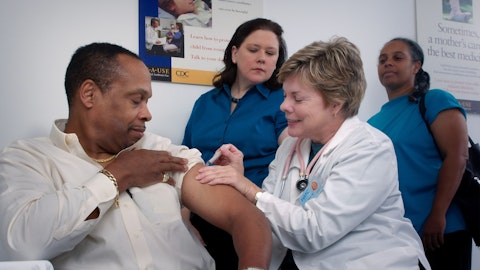Joseph Payne: That’s a great question. And I think Seamus if we did not see the success that Horizon Pharma was having with RAVICTI. I think we would have had a different perspective. But the fact that they were able to generate over $250 million in revenue annually on only 500 patients is a very encouraging opportunity for us. And assuming that, you know, RAVICTI only sequesters ammonia if our mRNA therapeutic succeed, we can prevent these people from generating ammonia, hopefully, right? And so that or at least keeping the ammonia at a baseline level. And hopefully having a normal protein diet, so obviously, the opportunity to have a small in select market share is very lucrative financially for a small company like ours. And certainly we’re discouraged by the slow uptake in the patient recruitment. But I believe the steps that we’ve taken here in the near term should encourage us to accelerate that process here in the first half of next year.
Padmanabh Chivukula: Yeah. We remain committed to the program, and it’s not just as a value — valuable asset, but it also represents the flagship asset for the platform for intravenously dosed or systemically administered mRNA, and there is value taking into consideration for that.
Seamus Fernandez: Appreciate it. Thank you, guys.
Padmanabh Chivukula: Thanks, Seamus.
Operator: The next question comes from Yigal Nochomovitz with Citi. Please proceed.
Carly Kenselaar: Hi. This is Carly on for Yigal. Thanks for taking our questions. We had a couple on the head-to-head bivalent study. First just wanted to clarify was that study requested by regulators in additional geographies outside of Japan? And then second, more generally, I guess, just wondering how you’re thinking about the market opportunity in Japan for bivalent versus 154, and how that affects Meiji’s commercial launch strategy in Japan? Thank you.
Joseph Payne: Yeah, thank you for the question. All the regulatory agencies have united in their message for monovalent COVID vaccines. The reason that we’re proceeding as a collaboration between Meiji, CSL, and Arcturus here, the reason we’re collecting bivalent data is that we don’t have to do it in the future. So if there is ever a reason why the regulatory agency changes their view or opinion and bivalency becomes more important, then we will not need to do a trial at that time. We’re just taking care of that now. It does strengthen the platform though to have monovalent Phase 3 comparison data and then add to that, the bivalent comparative data with bivalent Comirnaty. But that’s the reason we’re proceeding with collecting the bivalent data just to strengthen the platform and to prevent us from going back and doing a trial if it’s ever requested in the future.
Carly Kenselaar: Okay. Got it. That makes sense. And then just one quick follow-up, I think in the past you and Meiji have maybe talked about an XBB specific vaccine candidate. Just curious if there was an update on the status or the strategy for that program.
Joseph Payne: Sure. Sure. The XBB vaccine update is a monovalent update, some of our partners have started to communicate about this version of the vaccine. It’s called ARCT-2303 and again it’s a monovalent updated asset. And so all the monovalent ARCT-154 data that we’re collecting is very meaningful and relevant to that asset. With respect to updates on activities around that asset, we haven’t disclosed those publicly, but there will be an opportunity for us to provide an update on our next call.
Carly Kenselaar: Okay, that’s very helpful. Thank you.
Operator: The next question comes from Yanan Zhu with Wells Fargo. Please proceed.
Unidentified Analyst: Hello. This is [Quan] (ph) on for Yanan. Thanks for taking our questions. So two questions on COVID. So the first one is on the data that you recently presented at mRNA Healthcare Conference. Can you tell us how the data would translate to differentiation and potentially commercial success? And the second question is after the potential approval in December, can you share with CSL — sorry, would CSL — with CSL launch, based on this monovalent regional vaccine or would they — would they wait for the — for example, XBB update. Thank you.
Joseph Payne: Sure. So with respect to the leading commercial or marketing advantages of this platform as we’ve touched on them already in this call, but I think clearly the buyers here will be very interested in our durability data. They want a more durable vaccine technology. The increased antibodies, of course, has not only an improved immune response but an implied efficacy benefit that would be interesting. And then as we go deeper into the endemic COVID market and as that gets established is going to be an increased emphasis on safety. So I think the meaningfully, the fact that this technology is a much lower dose is going to be emphasized, because of the potential safety benefits associated with dose-related toxicology. So durability increased antibodies and at a much lower dose with potential safety benefits is going to be the initial strategy. Now with respect to the — you had another question, could you repeat that for us?
Unidentified Analyst: Sure. So after the potential approval in December, would CSL launch based on these like original vaccine, or will they potentially wait for the XBB updates and launch that vaccine instead. Thank you.




